UVP 003: Wildlife Veterinarian Dr. Mike Cranfield
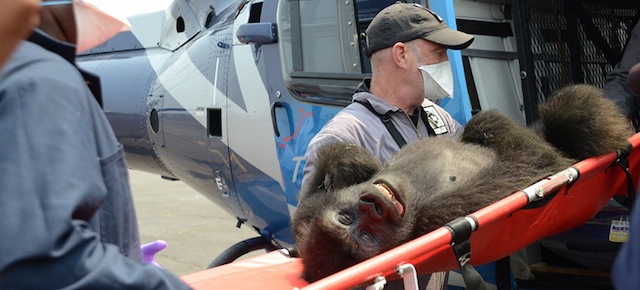
I can see you now, staring at the clock and counting down the minutes until your physiology professor lets you out for lunch. Or maybe you’re standing in an exam room, trying to appear interested as a well-meaning older gentleman goes into great detail about his Yorkie’s quite normal bathroom habits.
Your eyes glaze over and you find yourself wondering,
[quote]Are there really any vets who actually get to spend their lives doing hands-on clinical work with wildlife, traveling around the world, and making meaningful contributions to public health, conservation, and economic development?[/quote]
Well maybe it wasn’t those words exactly, but you know the feeling. Do these dream jobs really exist?
I’m excited to remind you in this episode of The Uncommon Veterinarian Podcast that yes, they do, and to share some practical insights about how you can make these dreams a reality.
Dr. Mike Cranfield: Co-Director of the Gorilla Doctors
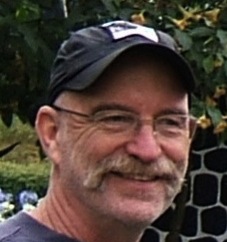 I first met Mike Cranfield at a special presentation he made for student representatives at the North American Veterinary Conference several years ago. I remember listening with rapt attention as this handlebar mustached vet described his incredible work with the Mountain Gorilla Veterinary Project in central Africa, and I found myself thinking, Wow, I would love to be in his shoes one day. We crossed paths again at a zoo and wildlife medicine conference I attended a couple of years after finishing vet school.
I first met Mike Cranfield at a special presentation he made for student representatives at the North American Veterinary Conference several years ago. I remember listening with rapt attention as this handlebar mustached vet described his incredible work with the Mountain Gorilla Veterinary Project in central Africa, and I found myself thinking, Wow, I would love to be in his shoes one day. We crossed paths again at a zoo and wildlife medicine conference I attended a couple of years after finishing vet school.
My interest in the Gorilla Doctors and their work with mountain gorillas in central Africa has continued to grow over the last couple of years, and it has even found its way into the plot of my slowly growing novel. Stay tuned for more on that.
Although the whole conversation is worth listening to, I especially love this parting advice from Dr. Cranfield:
[quote]You have to apply yourself, and you have to be ready to open the doors of opportunity when they’re there. As you progress in your career more and more doors open and you have to be willing to walk through them and not give up. People say, “Well I really wanted to do that but I don’t think there are enough opportunities.” I don’t believe that. I think there are more and more opportunities coming. There’s so much room in conservation and One Health and all of those things that you can almost make a niche for yourself. So keep on going and find your own little niche, because there are enough out there.[/quote]
Links We Mentioned
Gorilla Doctors: This is the organization that Dr. Cranfield works with. It was called the Mountain Gorilla Veterinary Project until it joined forces with the UC Davis Wildlife Health Center (below) in 2009. The main site has a ton of fascinating information about the program, while the blog, Facebook page, and Twitter account keep me updated on the daily activities of the vets working there in Africa. The YouTube channel also has a number of quality videos featuring the work of the Gorilla Doctors. All the photos in this article come from the organization.
Mountain Gorilla Tourist Interaction Video: This is the video I mentioned that went viral on YouTube and has probably helped encourage the strong demand for gorilla tourism in Uganda, Rwanda, and the DRC.
Toronto Zoo Residency Program: Dr. Cranfield explains that he worked in a large animal clinical practice until he was able to get this residency position. The Ontario Veterinary College now teams up with the Toronto Zoo to offer a three-year combined residency and Doctor of Veterinary Science (DVSc) program in Zoological Medicine and Pathology.
UC Davis Wildlife Health Center: This is where Dr. Cranfield and the Mountain Gorilla Veterinary Project are based. Take a look through the list of programs and staff when you’re in the mood to be inspired.
One Health Initiative: The One Health term is really being embraced in the veterinary community, but a lot of work still needs to be done to bring our human and environmental counterparts on board. UC Davis hosts the One Health Institute which has provided some important leadership in this.
Clinical specialists working with zoos: We discussed this as another option for practicing vets who want to get involved in the zoo and wildlife fields. Every zoo veterinarian has a list of specialists who they call whenever they’re facing a situation requiring expertise beyond their more generalized training. Steven Rosenthal is a veterinary cardiologist working in private practice who also serves as a cardiology consultant for the National Zoo and the Maryland Zoo. Veterinary ophthalmologist Seth Koch consults for the Chesapeake Wildlife Foundation and the National Zoo.
What You Will Learn in This Episode
- what you need to do now to prepare yourself for a career as a zoo or wildlife veterinarian
- why Dr. Cranfield is glad that he worked as a regular large animal vet for a couple of years after vet school, even though at the time he wanted to get into a residency program right away
- why it’s valuable for students to get international experience while they have easier opportunities to do so during school
- the financial realities that aspiring zoo and wildlife vets need to be aware of as they make career choices
- why Dr. Cranfield thinks that pursuing a PhD would be an excellent option for veterinarians interested in a career transition into the wildlife or zoo fields
- some alternative options for mid-career veterinarians who are interested in getting more involved with zoo/wildlife species or conservation
Are you ready to walk through the doors of opportunity and create a niche for yourself?
It won’t be easy, that’s true. But are the sacrifices worthwhile if you get to spend your life doing work that excites and fulfills you?
The Interview
You can watch the video of our conversation right here, but keep scrolling down for the audio version which you can download for more convenient listening in the car, at the gym, or while you’re out walking the dogs.
The audio podcast also has a little bit higher production quality, with my best radio personality voice on the introduction and original music from my little brother Jonathan.
Thank you to everyone who has rated the podcast or left reviews for it on iTunes! I really appreciate your support.
Keep dreaming!
Podcast: Play in new window | Download | Embed

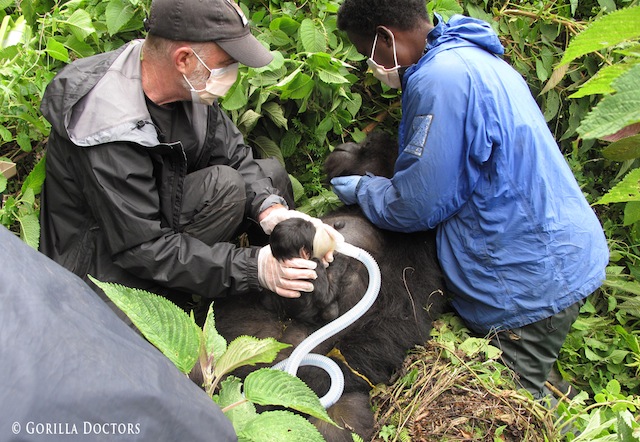
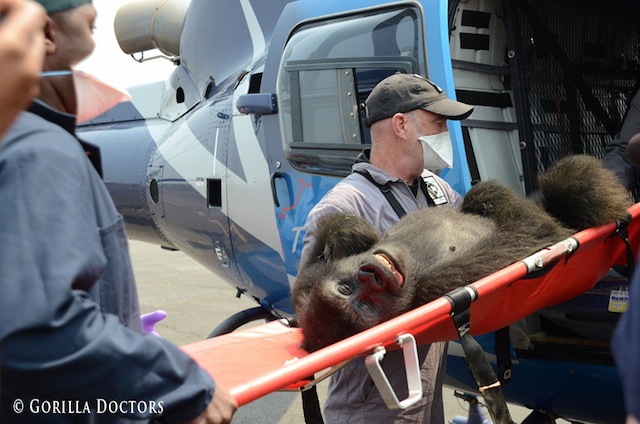
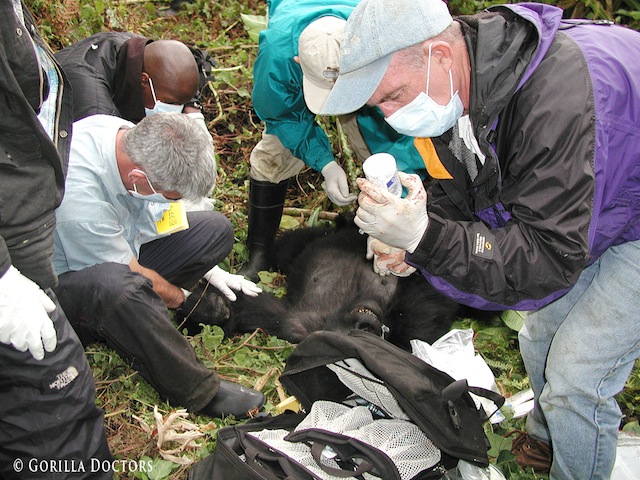
Comments
These podcasts are a great addition to your site! Keep up the good work!
Thanks Colin – it’s fun to have this excuse to talk to all my veterinary heroes. I’m excited to do an interview with you after you’ve been with the Epidemic Intelligence Service for a while!
Outstanding podcast! Thanks.
Glad you enjoyed it, Rhett! It was fun to talk with Mike and imagine myself in that kind of job one day.
Elliott,
Thanks for creating this website. This is exactly the direction I see my career heading, so thank you for gathering all this information and advice from those further along in their career.
I am heading to vet school this fall, but have long struggled with the choice of vet school versus PhD and which route is best for me, particularly with such a huge difference in cost, which is probably the scariest factor in pursuing a DVM degree for me. Even now I am wondering if I need/want a PhD in addition to a DVM to get involved in the public health/wildlife/conservation medicine fields. I would like to know more about how career opportunities vary between the two routes particularly in the field of wildlife/conservation medicine. I have heard advice that more veterinarians will be needed in conservation work, but also that a PhD is really necessary to pursue research. I would love to get more advice on this.
I enjoy hearing your interviews with those veterinarians who are doing unusual veterinary work, particularly research oriented. I would love to know from these individuals whether they feel their DVM degree was necessary for the work they are doing now. Do they feel they use their DVM degree in their daily work? Could they have gotten to where they are with a PhD? If they were doing their training over today, would they still pursue a DVM or go for the PhD (or Masters)? Or both? Or something else? Given the extremely high cost of education for a veterinary degree these days , do they think the added benefit of that degree is worth it or necessary for the field they are in?
Thanks for putting this altogether. It is really nice to have all this very useful information gathered in one place. I really enjoy your interviews with veterinarians further along in their careers. I really appreciate their advice and stories of how they got where they are.
Laura, thanks so much for your thoughtful comments. I’m glad you have found the interviews useful and inspiring!
I’ve thought a lot about these same questions that you’ve brought up. Now that I already have the DVM at least that part of the decision is over, but I still wonder about doing a PhD. It’s true that a number of PhD wildlife biologists, ecologists, and others are able to do the same types of hands-on research with wildlife species that veterinarians do. It’s also true that as a vet you probably need to “prove yourself” in the research field with either another graduate degree or else some specific and productive experience in the field.
I will be sure to ask some of your questions to my future interviewees — thanks for the ideas! I think most people are proud of being able to call themselves “vets” even if though don’t use those vet-specific skills on a regular basis. Is that little bit of pride worth the $200k cost of the education, though? That’s the question.
Thanks again and stay in touch!
Dr. Garber,
Your podcast and your experiences are immensely inspiring to me as a veterinary student. Wildlife conservation has always been a passion and love learning about the opportunities out there. I especially enjoyed this interview because I just attended a talk by a primate keeper who has worked with Dr. Cranfield.
I aspire to someday follow in the footsteps of veterinarians such as yourself and Dr. Cranfield.
Thanks for taking the time to comment, Shaina. It really means a lot to me! That’s cool that you also got to hear from a keeper who has worked with Dr. Cranfield. He’s known around the world now as the gorilla vet, and it seems like he knows everybody. Good luck as you continue down this path and let me know how it’s going every now and then!
I would love if I could interview you on my senior project regarding wildlife rehabilitation and conservation! It would be a great insight.
Hey Reann, I would be happy to answer some questions for your project. Just contact me through the “contact me” page here on my site and we can work out the details! I probably wouldn’t be as insightful as Dr. Cranfield, since he has much more experience in the field, but it’s tough to get in touch with him since he is traveling in Africa so much.
Hi, I just wanted to say that this is really inspiring! I just found this site, and i´m happy I did. I love animals, and I have always been interested in them, caring for them, and being around them. I didn’t know what I was going to do with my life, I was actually pretty worried about it. I´m still a high school student, going on a Junior after summer is over, so you can imagine why I was scared. A couple days ago I received an email from a school councilor.
We have talked about my interest of Wild Life Veterinarians, of animals around the world. She included a couple links, including this one, and I realized that this is really what I want to do. I want to care for animals, be around different species, do as much as I can for them. It looks very difficult, and looks as if it takes allot of Willpower, and dedication. But I want to try!
I love being outdoors, and actually have many animals myself, from the common Walmart fish, to dogs, to cats, to horses, sheep, goats, chickens, etc. i love caring for them, and be around them, and doing everything I can for them. While I was freaking about what I could do in life, a councilor pointed out that I should do something I love, something that makes me happy, something that will never get boring, that´s hands-on, that tests me everyday. And I realized all that had to do with animals. Not exactly in a office, but in the field!
I hope to watch more of your videos and learn as much as I can about others experiences. I´m trying to figure out where and how I should start, but my hope is i´ll figure it out the more I research.
Again, thank you for this pod cast!
Thank you for this inspiring article. I am vet school student in S.Korea wanting to be a wildlife vet. All the words were very very inspiring and meaningful for me.
Thanks for taking the time to comment, JiYe! I agree that Dr. Cranfield’s work is inspiring, and I hope I can contribute in similar ways through my own career.